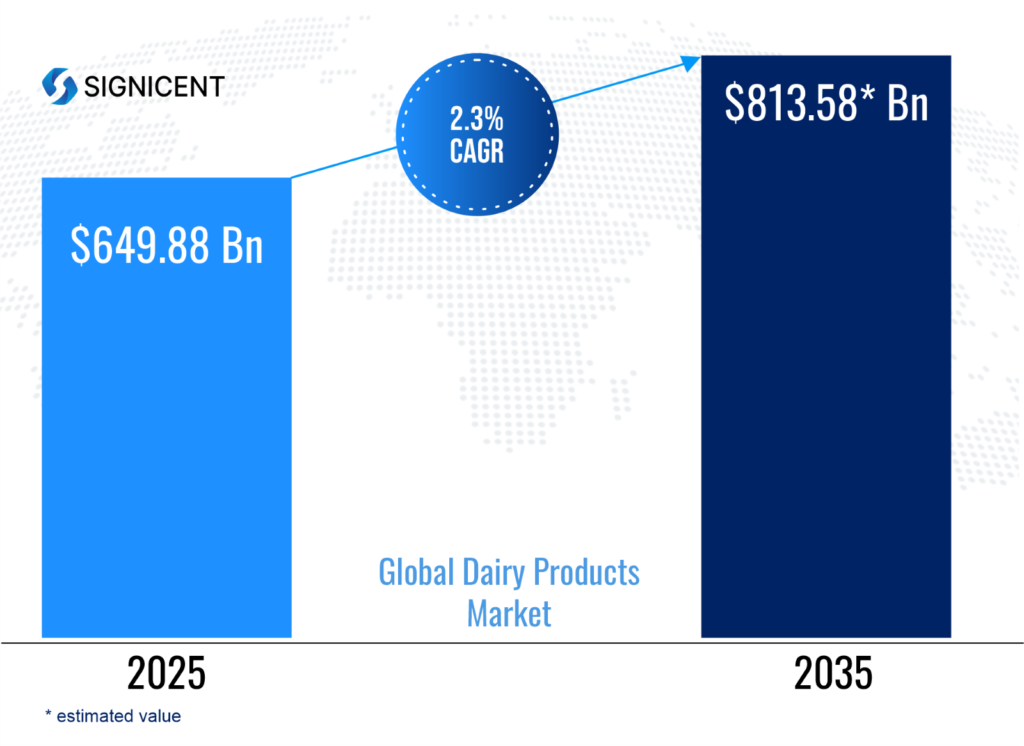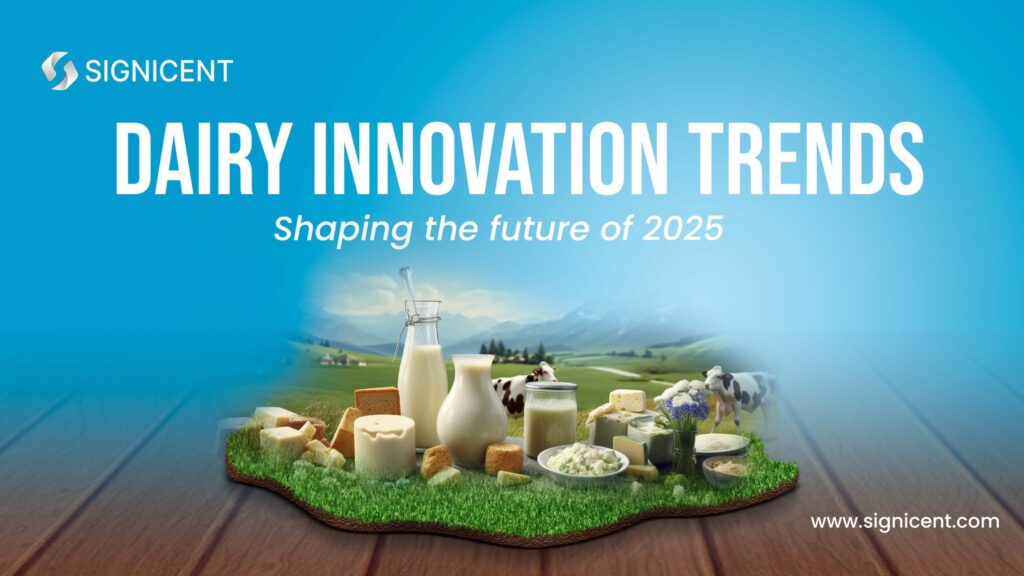Nowadays, plant-based milk is becoming a healthier choice for nutrition-conscious consumers. Compared to conventional dairy farms, which face challenges like genetic diseases in animals, early spoilage, and chemical preservatives, plant-based alternatives offer a more sustainable and ethical path forward.
While traditional dairy contributes to over 50% of carbon emissions from the food industry due to intensive water use, land degradation, and greenhouse gas emissions, plant-based milk stands as a beacon of low-impact innovation. Genetic disorders like Bovine Spongiform Encephalopathy (BSE) and Mastitis in dairy cattle not only reduce productivity but pose threats to food safety and human health.
Today, the sector’s evolution is fueled not only by sustainability but also by shifting consumer expectations in health and digitalization. With a 17% drop in greenhouse emissions and smarter practices, the dairy sector is rewriting its purpose in a health- and planet-conscious world.
But what’s truly behind this “new age” of dairy? In this blog, discover how Technology Gap Analysis is driving smart, sustainable dairy innovations—from AI-driven quality control and plant-based proteins to gut-health-focused products and methane-reducing solutions. By identifying what’s missing in current technologies and where future potential lies, this approach enables companies to bridge innovation gaps and create dairy solutions that are healthier, more efficient, and environmentally aligned.
The Harsh Reality of Dairy Farming Today
Yes, behind every glass of traditional milk lies a chain of health and ethical concerns that often go unnoticed. From disease transmission to chemical-laced preservation, the darker side of dairy production is a growing global concern.
Below, you’ll find the alarming realities that are pushing many toward safer, plant-based alternatives:
- Zoonotic Disease Risks: Dairy cows suffer from bovine tuberculosis, brucellosis, and mastitis, which can spread to humans through milk.
- Antibiotic Overuse: To keep cows alive in cramped conditions, farms overuse antibiotics, contributing to drug-resistant superbugs (a leading global health threat).
- Chemical Contamination: Many dairy producers illegally use formalin, hydrogen peroxide, and urea to extend shelf life, linked to cancer and organ damage.
Can Plant-Based Milk Outperform Traditional Dairy Products?
Yes, there are plenty of benefits compared to traditional dairy products. Plant-based milk isn’t just a trend—it’s a smarter, cleaner, and more conscious choice. From being allergy-friendly to offering longer shelf life without preservatives, it aligns with the needs of today’s health-aware and sustainability-driven consumers.
Below, you can see the key advantages that make plant-based milk a strong contender:
Key Advantages
- Longer Shelf Life: Often doesn’t require harmful preservatives.
- Allergy Friendly: Lactose-free and suitable for those with dairy intolerances.
- Lower Environmental Impact: Reduced water usage and land demand.
- Versatility: Can be used in baking, cooking, and beverage mixing.
Nutritional Innovations
- Fortified with calcium, vitamin D, and B12
- Made with almonds, oats, soy, and chickpeas
- Lower in saturated fats and cholesterol
Traditional vs Plant-Based Dairy: Comparative Table
When it comes to health, sustainability, and innovation, plant-based milk is stepping up where traditional dairy falls short. From lactose-free nutrition to lower environmental impact, the comparison table below reveals why consumers are making the shift.
| Feature | Traditional Dairy | Plant-Based Alternatives |
| Lactose Content | High | Zero |
| Shelf Life Without Additives | Low | Moderate to High |
| Water Usage per Liter | ~628 liters | ~48 liters (for oat milk) |
| Greenhouse Gas Emission | High (Methane & CO2) | Low |
| Saturated Fats | High | Low |
| Allergen Risk | Higher | Lower (except for nuts & soy) |
7 Reasons Why Dairy Farms Are Falling Behind in Today’s Eco-Conscious World
The dairy industry is under pressure. From health concerns to environmental impact, traditional milk is struggling to keep pace. Plant-based alternatives are stepping forward with cleaner, smarter solutions—driven by innovation and shifting consumer demand.
As these new entrants flood the market, Patent Invalidity Analysis plays a critical role in helping companies navigate the competitive landscape, challenge weak IP barriers and safeguard their innovations while accelerating clean-label and sustainable dairy solutions.
1. Disease and Antibiotic Resistance
Dairy cows often suffer from infections like mastitis. Farms rely heavily on antibiotics, which leads to drug-resistant bacteria. These diseases can pass on to humans.
Plant-based milk avoids all these risks.
2. Extreme Water Use
Producing one liter of dairy milk needs around 628 liters of water.
Plant-based milk like oat uses only 48 liters—saving both water and energy.
3. Chemical Contamination
Some dairy milk is found contaminated with harmful chemicals like formalin, detergents, and urea—added to increase shelf life or thickness.
Plant milk needs no such preservatives.
4. Lactose Intolerance
Most people worldwide cannot digest lactose, leading to bloating and discomfort after drinking dairy.
Plant milk is naturally lactose-free and easier to digest.
5. Animal Cruelty
Dairy cows face repeated forced pregnancies, early separation from calves, and live much shorter lives.
Plant-based milk is 100% animal-free.
6. Short Shelf Life
Dairy milk spoils within 7–10 days even with preservatives. In contrast, unopened plant-based milk stays fresh for 6–12 months without chemical additives.
7. High Carbon Emissions
Dairy farming produces over 3 kg CO₂ per liter. Plant-based options like oat milk emit only 0.9 kg—cutting environmental impact by more than two-thirds.
Artificial vs Natural Dairy Additives: Comparison
A Deep Comparison Between Nature-Derived and Synthetic Additives in Dairy
As consumers grow conscious of health and transparency, the contrast between artificial and natural dairy additives reveals critical differences in source, safety, and functionality.
| Property | Artificial Additives | Natural Additives |
| Source | Synthetic chemicals | Plant extracts, enzymes |
| Impact on Taste | Can degrade flavor | Usually enhances or neutral |
| Preservation | High chemical dependency | Natural stabilizers, e.g., cellulose |
| Health Concerns | Potential long-term effects | Minimal, if any |
Modern Solutions for Today-Age Problems
These cutting-edge dairy innovations—spanning CPT to UV pasteurization—solve modern health, taste, and shelf-life challenges while aligning with cleaner, smarter, and future-ready food systems.
- Customized Phase Treatment (CPT): Combines microwave and microfiltration techniques to produce long-lasting milk without compromising taste.
- LAB-Fermented Yogurt with Anti-Hypertensive Benefits: Utilizes soy and Job’s tears to create functional yogurts.
- Slow-Melting Fiber-Enriched Ice Cream: Incorporates bacterial cellulose to enhance texture and shelf life.
- Raslysation Technology by Lyras: Employs UV-based sustainable pasteurization methods.
Below you can see how Signicent has assisted clients in overcoming challenges within the dairy sector.
Signicent has once again taken a deep dive into the State of Dairy, uncovering eight powerful trends that are reshaping the landscape. After examining research papers, patents, forums, and market reports, we’ve identified innovations that are redefining dairy’s future—from gut-friendly formulations to shelf-stable yogurts and methane-reducing animal feed.
| New Age Technology & Factor | Benefits | Products |
| Whey Protein Hydrolysates (cleaner protein) | Better digestion, natural nutrition, fewer additives | Protein shakes, fortified milk |
| HMObiotics (human milk oligosaccharides + probiotics) | Boosts immunity, improves gut health, allergy reduction | Yogurt, infant formulas, probiotic drinks |
| Shelf-Stable Yogurt (no refrigeration needed) | Longer shelf life, convenient, maintains probiotics | Yogurt, probiotic snacks |
| Enhanced Vegan Cheese Meltability | Real cheese texture and melt, appeals to vegans | Plant-based cheese |
| Stabilized Plant-Based Milk (no sedimentation) | Better texture, no synthetic stabilizers, cleaner label | Soy milk, almond milk, oat milk |
| Immunoglobulin-Fortified Milk | Supports immunity, adds nutritional value | Fortified milk and dairy drinks |
| Methane-Reducing Feed for Cows | Cuts methane emissions, supports climate goals | Dairy cow feed additives |
New-Age Innovative Techniques Transforming Dairy
From AI-driven sensors to fermentation-based proteins, the dairy industry is undergoing a radical shift—merging smart tech, health innovations, and sustainability to align with today’s conscious and evolving consumer demands.
- Smart Sensors in Milk Quality Monitoring: Real-time AI-powered tools to track milk freshness, fat content, & safety.
- Precision Dairy Farming: Sensors, drones, and IoT devices optimize cattle health, feed efficiency, and yield.
- Fermentation-Based Dairy: Creating dairy-identical proteins without cows – via microbial fermentation.
- Plant-Based & Hybrid Dairy: Almond, oat, and pea-based milks fortified to mimic traditional dairy benefits.
- Probiotic & Functional Dairy: Fortified yogurts and cheeses to improve gut health, immunity, and metabolic support.
- Eco-Friendly Packaging: Biodegradable, smart-labeled cartons with QR code traceability.
Top Benefits of Switching to Plant-Based Dairy
Health Benefits:
- Less saturated fat
- No lactose intolerance issues
- Rich in plant-based protein and fiber
Environmental Benefits:
- Up to 90% less water usage
- Minimal carbon footprint
- Reduced methane emissions
Functional Benefits:
- Extended shelf life with minimal additives.
- Enhanced functionality tailored for specific health benefits.
- Reduced environmental impact through energy and water conservation.
Spotlight on Transformative Startups & Companies
Startups are driving the future of dairy by blending innovation, health, and sustainability into every scoop, sip, and spoonful.
Artinci: Known for sugar-free, keto-friendly ice creams packed with superfoods, Artinci is also innovating low-calorie frozen desserts and dairy-free yogurts targeting health-conscious consumers.
CHKP: Beyond their protein-rich, probiotic chickpea yogurts, CHKP is developing plant-based cheeses and fermented beverages aimed at improving gut health and expanding plant-based options.
Lyras: Famous for energy-saving UV pasteurization systems like Sirius and Spica, Lyras is advancing sustainable processing solutions, including UV sterilization for juices and plant-based milk alternatives.
Below are key products specially developed to meet consumer needs. Advanced technology ensures the natural taste matches expectations:
| Product Name | Health Benefits |
| CHKP Yogurt | Supports digestive health, suitable for patients with digestive disorders |
| Artinci’s Ice Cream | Suitable for diabetics and health-conscious consumers due to sugar-free, keto-friendly formulation |
| Oat Milk Latte | Rich in fiber, lactose-free, supports heart health |
| Chickpea Yogurt | High in protein and probiotics, promotes gut health |
| Almond-Based Ice Cream | Low in saturated fat, lactose-free, nutrient-rich alternative |
Market Outlook: Growth and Key Players
The dairy and plant-based milk market is growing rapidly, driven by increasing consumer demand for healthier, sustainable, and ethically produced options. Innovations in fermentation, plant protein extraction, and eco-friendly packaging are reshaping the industry across food, beverage, and nutrition sectors.
According to Signicent Market Research, this market is evolving fast. It is expected to expand significantly due to advances in plant-based formulations, functional dairy alternatives, and technologies that improve taste, shelf life, and environmental impact.

Key Players in the Dairy Innovation Space
Recently, Signicent successfully assisted a client in innovating within the plant-based dairy sector by identifying advanced protein alternatives and novel fermentation techniques to improve taste, texture, and nutrition. Our in-depth services included technology scouting, IP landscaping, and competitor benchmarking to discover high-performing ingredients such as chickpea and oat derivatives, along with clean-label emulsifiers and fortification methods.
We also performed a comprehensive white space analysis to map unmet consumer needs—such as lactose-free, gut-friendly, and low-sugar formulations—while revealing growth opportunities in hybrid dairy, functional beverages, and sustainable packaging.
If you’d like to explore the full innovation roadmap or discuss a tailored solution for your brand’s plant-based transition, connect with us for detailed insights and strategic support.
Conclusion
Dairy substitutes that are plant-based and technologically advanced are not a niche product anymore; rather, they are essential to the upcoming food revolution. Dairy is changing with precision fermentation, fortified plant proteins, and sensor-driven quality monitoring as consumers’ expectations are reshaped by health and environmental concerns.
In order to meet clean-label requirements, we have assisted industry leaders in locating bio-based ingredients, up-and-coming entrepreneurs, and sustainable processing techniques. In the future, developments like AI-enhanced traceability, gut-boosting probiotics, and hybrid dairy will further improve value and transparency. The change is happening more quickly even though it is difficult to replicate texture, taste, and regulatory adaptability.
These ideas aim to create a more intelligent, healthy, and environmentally friendly future rather than merely replacing conventional dairy, their ascent is a reflection of a larger dedication to long-term planetary health, nutritional integrity, and responsible consumption.
About Signicent LLP
We assist businesses globally in their technology innovations, R&D, new product development, patents, valuation, product commercialization & market research needs.
Services Offered:
- Patent Landscape
- Patent Portfolio Analysis
- Patent Invalidity Search
- Patent Licensing Services
- Freedom to operate (FTO)
- Chemical Structure Search
- Design Patent Search
- Technology Scouting
- Technology Landscape Analysis
- Technology gap analysis
- Technology Intelligence
- Market Research
- Bio Sequence Search
Elevate your Innovation and Research with Signicent’s cutting-edge approach to assist you with Technology and Market related matters alongside the IP aspect of the analysis.


